The defeat of the pirate states of the Maghreb
Barbary pirate raids continued throughout the eighteenth century. But now the main arena of their actions has again become the Mediterranean Sea. After the capture of Gibraltar by the Anglo-Dutch squadron in 1704, the corsairs of Algeria and Tunisia were no longer able to freely enter the Atlantic Ocean. Here, the pirates of Morocco continued to operate, although, encountering an increasingly brutal rebuff in the vast expanses of the Atlantic, they no longer delivered the previous troubles. However, in the Mediterranean, merchant ships continued to be attacked by Maghreb corsairs and the coasts of European countries still suffered from their raids. Back in 1798, pirates from Tunisia sacked the city of Carloforte on the island of San Pietro (near Sardinia), capturing there 550 women, 200 men and 150 children.
Tribute to the pirate states of the Maghreb
As a result, the governments of European states gradually began to think that paying the rulers of the Maghreb was easier and cheaper than organizing costly and ineffective punitive expeditions. Everyone began to pay: Spain (which set an example for everyone), France, the Kingdom of both Sicilies, Portugal, Tuscany, the Papal States, Sweden, Denmark, Hanover, Bremen, even proud Britain. Some countries, for example, the Kingdom of both Sicilies, had to pay this tribute annually. Others sent “gifts” when appointing a new consul.
The problems arose in US merchant ships, which earlier (until 1776) “passed” like the British. During the War of Independence, the French temporarily took them “under the wing”, but since 1783 American ships have been a welcome prey for the Maghreb pirates: they did not have agreements with the United States, and the capture of ships under the new flag was a pleasant bonus to received from other countries “ tribute. "
The first "prize" was the Betsy brig, captured on October 11, 1784 from Tenerife. Then the merchant ships Maria Boston and Dauphin were captured. Algeria dei demanded a million dollars for the captured sailors (a fifth of the US budget!), The US government offered 60 thousand - and American diplomats were shamefully expelled from the country.
The Libyan Pasha Yusuf Karamanli, who ruled in Tripoli, even requested $ 1 one-time per contract and 600 annually, moreover, in English guineas.
The Moroccans turned out to be more modest in their wishes, requesting $ 18, and an agreement with this country was concluded in July 000. It was somehow possible to agree with other countries only in 1787.
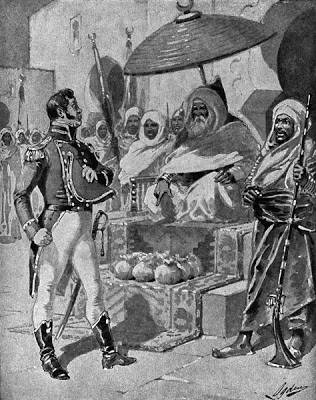
But already in 1797, Yusuf from Tripoli began to demand an increase in tribute, threatening otherwise “to raise a foot from the tail of the Barbary tiger” (this is how the Libyans spoke with the USA at the turn of the 1800th-250th centuries). In 50, he already demanded XNUMX thousand dollars as a gift and XNUMX thousand in the form of an annual tribute.
First U.S. Barbary War
On May 10, 1801, a flagpole with a flag was solemnly cut down near the building of the American Consulate in Tripoli - this theatrical action became an act of declaring war. And the newly elected president, Thomas Jefferson, went into history as the first US leader to send a combat squadron to the Mediterranean: Captain Richard Dale led three frigates there (44-gun “President”, 36-gun “Philadelphia”, 32-gun “Essex”) and 12-gun brig “Enterprise” ( which in some sources is called a schooner).
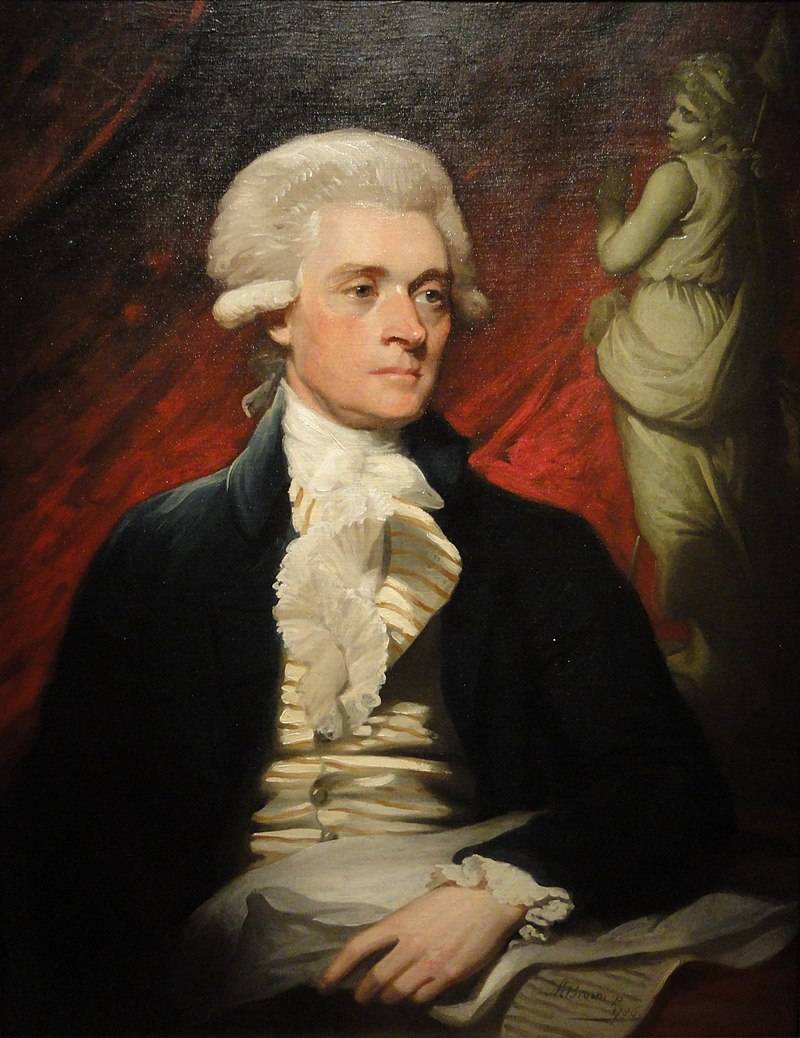
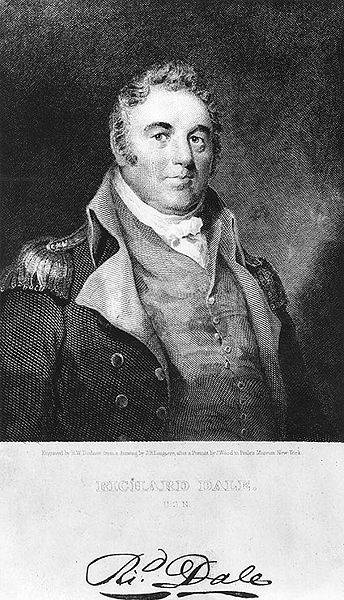
It turned out that the pirate states of the Maghreb are already at war with Sweden, whose ships tried to block their ports, and the Americans tried to enter into an alliance with this country. But they did not succeed in fighting together with the “Vikings”: soon the Swedes made peace, being content with the release of their compatriots for an ransom that seemed acceptable and non-destructive to them.
The Americans, too, were not eager for battle: Dale was given an amount of 10 thousand dollars, which he had to offer Yusuf in exchange for peace. It was possible to agree only on the redemption of prisoners.
The only combat clash that year was the battle of the Enterprise brig, commanded by Andrew Steret, with the 14-gun Pirate ship Tripoli. At the same time, both captains used the “military trick”.
The Enterprise approached the pirate ship, raising the British flag, and the captain of the corsairs greeted him, receiving a volley of airborne guns in response. Corsairs, in turn, twice lowered the flag, opening fire when trying to get closer.
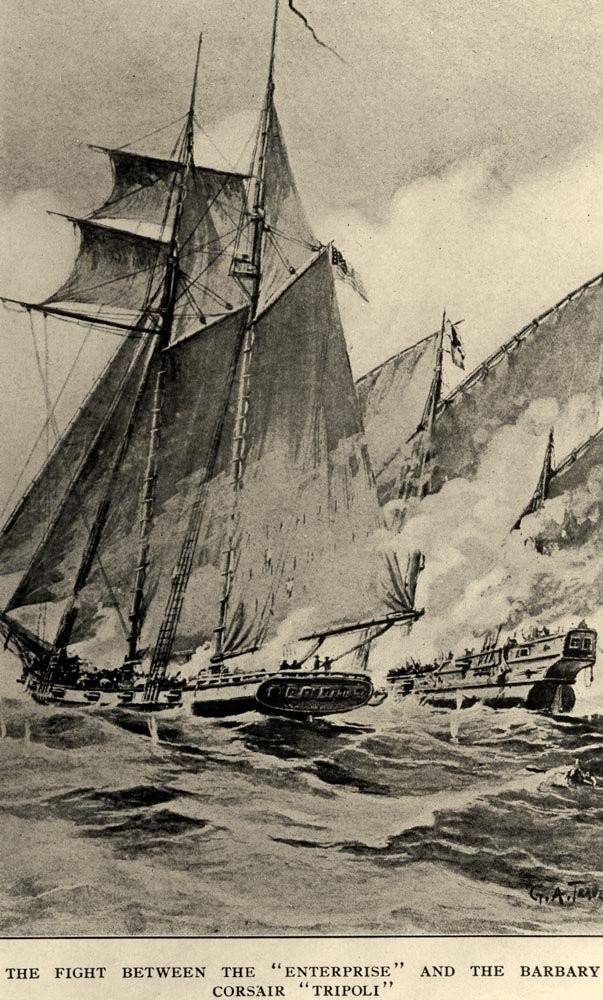
The victory remained with the Americans, but they did not know what to do with the captured ship, and even more so with its crew. Seret (like other captains) did not receive any instructions on this subject, which is further evidence that the Americans wanted to limit themselves to a demonstration of force and did not want a serious war at sea. He didn’t take responsibility. He didn’t: ordered to cut down the mast of the enemy’s ship, abandon everything weapon at sea, and the pirates themselves allowed to leave, raising the sail on a temporary mast.
In the United States, the news of this victory aroused great enthusiasm, Captain Seret received a personalized sword from Congress, the brig team received a monthly salary, and the frigate Boston and the sloop George Washington were additionally sent to the Mediterranean Sea.
However, all these ships could not come close to the shore - unlike the pirate shafts, who walked freely in shallow water.
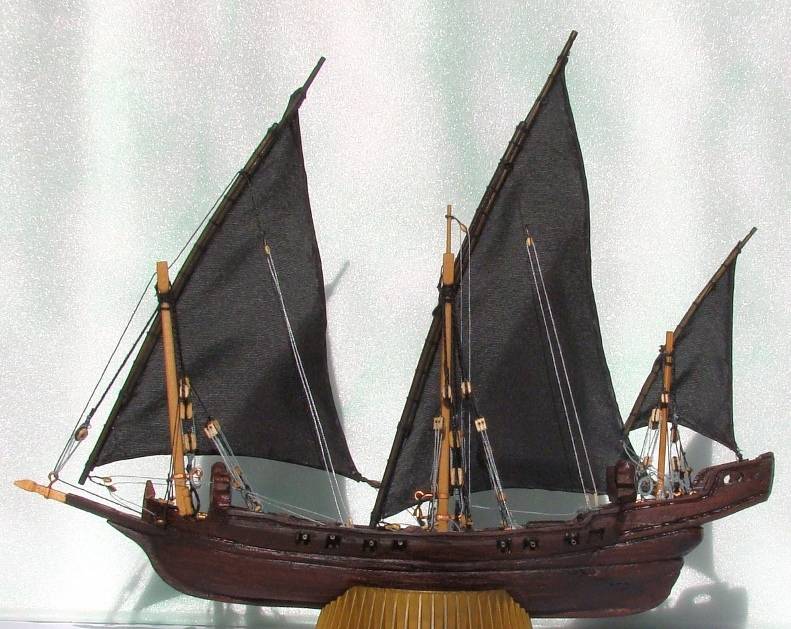
As a result of a full-fledged blockade of Tripoli, the corsairs continued to receive food and other supplies by sea and even seized the American trading ship Franklin, for which sailors had to pay a ransom of 5 thousand dollars. On this, the actions of the first American squadron off the coast of the Maghreb ended.
The next American squadron came to the Mediterranean under the command of Richard Morris, who was in no hurry, visiting almost all major European ports and Malta on the way. He even went to Tunisia, where, not knowing the intricacies of local etiquette, contrived to insult the local bey and was arrested on his orders. It was necessary for the American and Danish consuls to pay a ransom of 34 thousand dollars for him.
Meanwhile, the state of affairs in this region was by no means brilliant for the United States.
The Sultan of Morocco, Mulei Suleiman, threatening the United States with war, demanded 20 thousand dollars, which were paid to him.
Day of Algeria was unhappy that the annual tribute to him was paid not in goods, but in American dollars (absolutely no respectable decent people): I had to apologize to him and promise to fix this “cant”.
But Morris’s squadron, which had already gone on a campaign for a long time, still hadn’t reached the Libyan coast, aimlessly plowing the sea, and could not influence the situation. Only a year later she joined the battle: on June 2, 1803, the Americans, landing on the shore, burned 10 enemy ships, standing in one of the bays 35 miles from Tripoli. Yusuf did not impress these feats: he demanded 250 thousand dollars at a time and 20 thousand in the form of annual tribute, as well as compensation for military expenses.
Morris went to Malta with nothing. The US Congress accused him of incompetence and removed from office, replacing John Rogers. And a new squadron was sent to the Mediterranean Sea, commanded by Commander Edward Preble. Its structure included the heavy frigates “Constitution” and “Philadelphia”, 16-gun brig “Argus” and “Siren”, 12-gun schooners “Nautilus” and “Vixen”. The Enterprise brig joined these ships, already having a victory over the Tripolitanian corsair ship.
The start of this expedition was very unsuccessful: the 44-gun frigate Philadelphia, chasing the Tripolitan ship entering the port, ran aground and was captured by the enemy, the captain and 300 of his subordinates were captured.
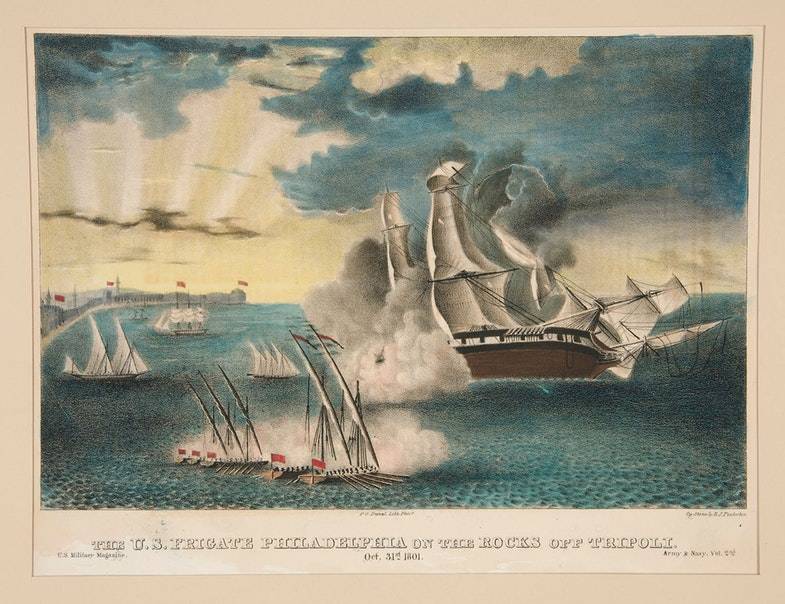
To prevent the inclusion of such a powerful ship in the enemy fleet, six months later, American sailors in a captured Berber ship (ketch "Mastico", renamed "Intrepid") entered the port, captured this frigate, but, having no opportunity to go on board to the sea, burned it. The most striking thing is that American saboteurs, taking advantage of the turmoil and confusion, managed, without losing a single person, to safely return back. They were led by a young officer, Stephen Decatur (who had previously captured this ketch).
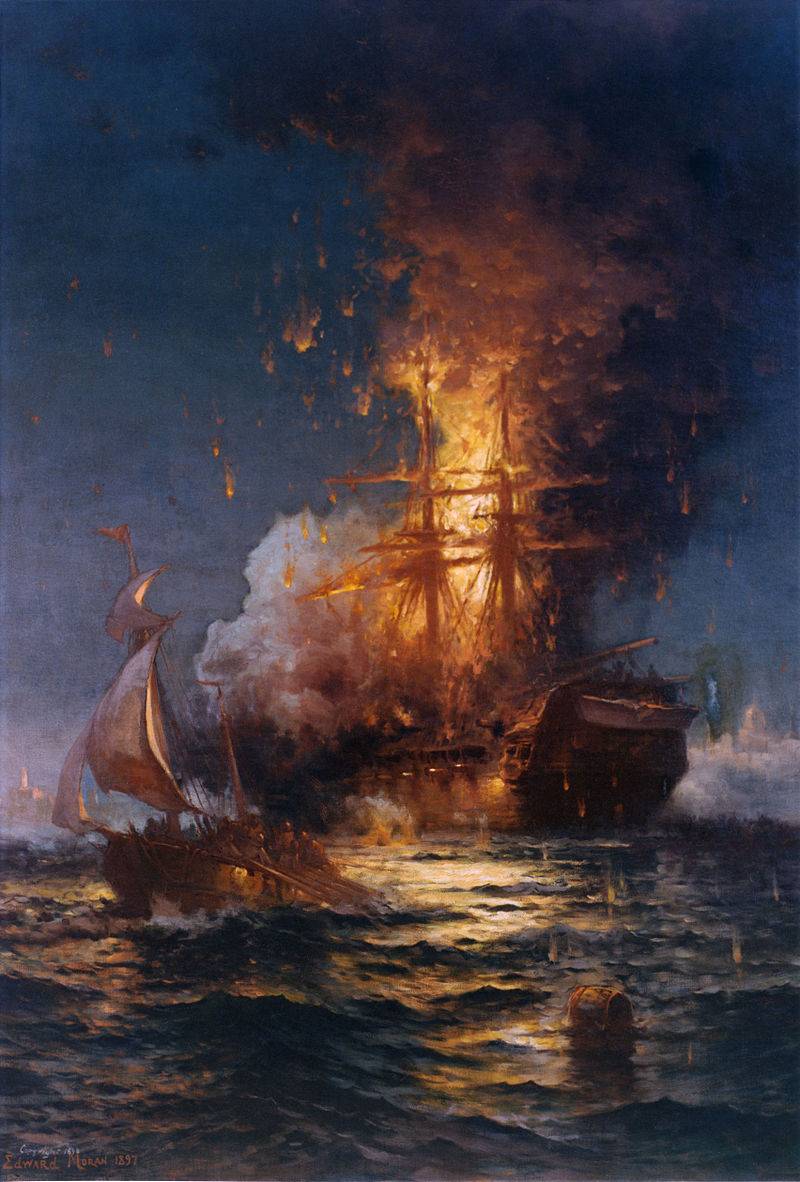
Admiral Nelson called this operation "the most daring and brave act of the century."
Now it's time to storm Tripoli. By taking credit in the Kingdom of Naples, Preble was able to hire the bombing ships he lacked. On August 3, 1804, under the cover of volleys of frigates, bombardment ships (gunboats) attempted to enter the harbor in order to crush coastal batteries and destroy the vessels that were on the roadstead. The battle was extremely fierce, Preble himself was injured, during the boarding fight, Stephen Decatur miraculously survived, and two gunboat captains were killed (including Decatur’s younger brother). The city was on fire, residents fled to the desert, but failed to capture it.
Preble entered into negotiations again, offering Yusuf $ 80 for prisoners and $ 10 as a gift, but Tripolitan Pasha demanded 150 thousand. Preble increased the amount to 100 thousand and, having been refused, on September 4 he tried to strike Tripoli using a firewall into which the captured Intrepid bombardier ketch was converted - as you recall, it was on it that a successful sabotage was completed, which ended in the frigate’s burning Philadelphia". Alas, this time everything turned out completely differently, and the firewall exploded ahead of time from the core released by the coastal battery, all 10 crew members were killed.
Preble and a naval agent in the "Barbarian States" William Eaton decided to "go from the other side": use Yusuf’s brother, Hamet (Ahmet), who was once expelled from Tripoli. With American money, a “army” of 500 people was gathered for Hamet, which included Arabs, Greek mercenaries and 10 Americans, including Eaton, who was the true leader of this expedition.
In March 1805, they moved from Alexandria to the port of Dern and, having traveled 620 km through the desert, captured it with the artillery support of three brigs. The words of the US Marine Anthem recall this storm:
We fight for our country
In the air, on land and at sea.
The Americans, of course, did not reach Tripoli, but they repelled two assaults of Yusuf's superior forces in Derna.
However, there is another version according to which the lines refer to the feat of the team of Stephen Decatur, who managed to burn the frigate "Philadelphia" (as described earlier). In this case, the mention of Tripoli is quite reasonable.
The appearance of the applicant was very concerned about Yusuf Karamanli. In June 1805, he made concessions, agreeing to take compensation from the Americans in the amount of 60 thousand dollars. The first U.S. Barbary war was over.
The results of this military campaign did not suit either the Americans or the Berbers.
Second Barbary War
Algeria's corsairs already in 1807 resumed attacks on American ships. The reason was the delay in the supply of goods on account of the tribute established by the last contract. In 1812, Algerian dei Haji Ali demanded the payment of tribute in cash, arbitrarily setting its size - 27 thousand dollars. Despite the fact that the US consul managed to collect the necessary amount in 5 days, Dei declared war on the United States.
The Americans were not up to it: in June of that year, they started the Second War of Independence (against Great Britain), which lasted until 1815. It was then, during the siege of Baltimore by the British, that Francis Scott Key wrote Fort McHenry's Defense, an excerpt from which, The Star-Spangled Banner, became the US anthem.
After the end of this war (February 1815), the US Congress approved a new military expedition against Algeria. Two squadrons were formed. The first, under the command of Commodore Stephen Decatur, who took an active part in the storming of Algeria in 1804, set off from New York on May 20.
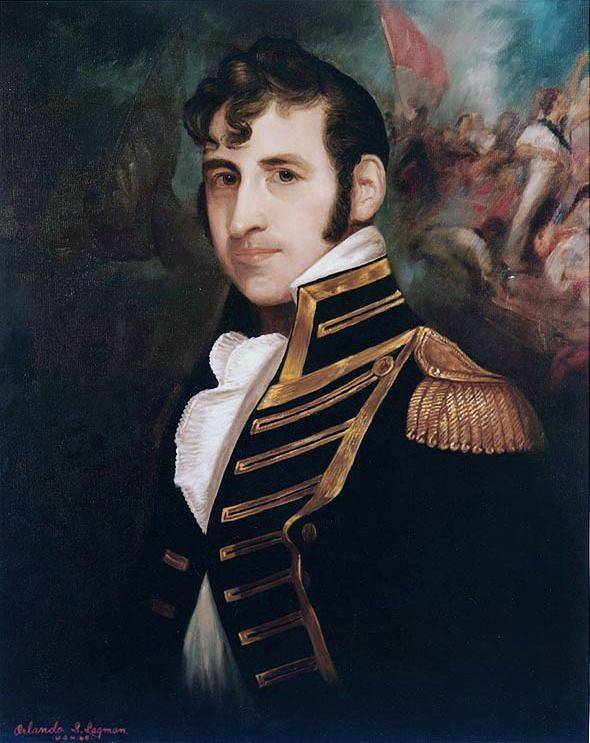
It consisted of 3 frigates, 2 sloops, 3 brigs and 2 schooners. The flagship was the 44-gun frigate Guerre.
The second American squadron (under the command of Bainbridge), sailed from Boston on July 3, arrived in the Mediterranean Sea after the end of this war.
Already on June 17, Decatur’s ships entered the first naval battle, during which the 46-gun Algerian frigate "Mashuda" was captured, 406 Algerian sailors were captured. On June 19, the 22-gun Algerian brigade Estedio, stranded, was captured.
On June 28, Decatur approached Algeria, negotiations with the Day began on the 30th. The Americans demanded the complete abolition of tribute, the release of all American captives (in exchange for Algerian) and the payment of compensation of 10 thousand dollars. The ruler of Algeria was forced to agree to these conditions.
After that, Decatur came to Tunisia, where he demanded (and received) 46 thousand dollars for two British ships that were "legally" seized by American privateers, but confiscated by local authorities. Then he visited Tripoli, where he also meekly paid compensation of 25 thousand dollars.
November 12, 1815 Decatur returned to New York. His triumph overshadowed the denial of all Algeria agreements.
The final defeat of the pirate states of the Maghreb
The following year, the combined fleet of Britain and Holland approached Algeria. After a 9-hour shelling (August 27, 1816), dei Omar capitulated and released all Christian slaves.
This surrender caused an explosion of discontent among his subjects, who openly accused him of cowardice. As a result, Omar was strangled in 1817.
The new rulers of Algeria, albeit on a smaller scale, continued pirate activities in the Mediterranean, attempts at coercion by European states in 1819, 1824, 1827. did not have much success.
But the situation still changed, Britain, France, Sardinia and Holland soon refused to pay tribute to Algeria, but Naples, Sweden, Denmark and Portugal continued to pay it.
In 1829, the Austrians hit Morocco: the fact is that, having annexed Venice, they refused to pay 25 thousand compensation thieves for it. The Moroccans captured the Venetian ship, which entered Rabat, the Austrians in response fired at Tetuan, Larache, Arzella and burned 2 brig in Rabat. After that, the Moroccan authorities officially refused financial claims against any Austrian possessions.
The problem of Algerian pirates was finally solved in the summer of 1830, when the French army captured Algeria.
In fact, the French still did not disdain cooperation with Algeria, their trading posts were located at that time in La Calais, Annaba and Collot. Moreover, the trade balance was not in favor of enlightened Europeans, and they received a number of goods (mainly food) on credit. This debt has accumulated since the time of Napoleon Bonaparte, who did not pay for wheat delivered to the soldiers of his Egyptian army. Subsequently, Algeria, also on credit, supplied France, corn, corned beef and leather. After the restoration of the monarchy, the new authorities decided to “forgive” their Algerian creditors and did not recognize the debts of revolutionary and Bonapartist France. Algerians, as you know, strongly disagreed with such methods of doing business and continued to brazenly demand the return of debts.
On April 27, 1827, during the reception of Consul General Pierre Deval, dei Hussein Pasha again raised the issue of debt calculations, and, pissed off by the defiant behavior of the Frenchman, slightly hit him in the face with a fan (rather, he even touched his face).
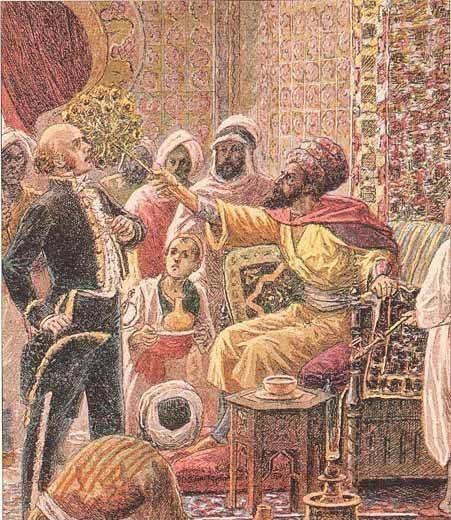
Then France did not yet feel ready for war, and the scandal was hushed up, but it was not forgotten: the incident was used to declare war on Algeria in 1830. The fact is that King Charles X and his government, headed by Count Polignac, were rapidly losing popularity, the situation in the country was heating up, and therefore it was decided to divert the attention of subjects by organizing a "small victorious war." Thus, it was planned to achieve a solution to several problems at once: to “raise the rating” of the monarch, to get rid of accumulated debts and send part of the disaffected population to Africa.
In May 1830, a huge French fleet (98 military and 352 transport ships) left Toulon and sailed to Algeria. He approached the shores of North Africa on June 13, the 30th army landed on the shore, the siege of the fortress lasted from June 19 to July 4.
Both the inhabitants of the city and its last ruler were little like the former selfless defenders of Algeria. Those wishing to die heroically were almost gone. The last day of independent Algeria Hussein Pasha capitulated. July 5, 1830, he went to Naples, leaving the country forever. The former dei in Alexandria died in 1838.

In its capital, the French captured 2 thousand artillery pieces and a treasury, in which there were 48 million francs.
So, the war with Algeria really turned out to be “small and victorious,” but it did not save Charles X: on July 27, fighting on the barricades began in Paris, and on August 2, he abdicated.
Meanwhile, the French who already considered themselves winners faced a new problem in Algeria: the emir Abd al-Qader, who arrived from Egypt, managed to unite more than 30 tribes and create his own state with the capital in Maskara in the north-west of the country.

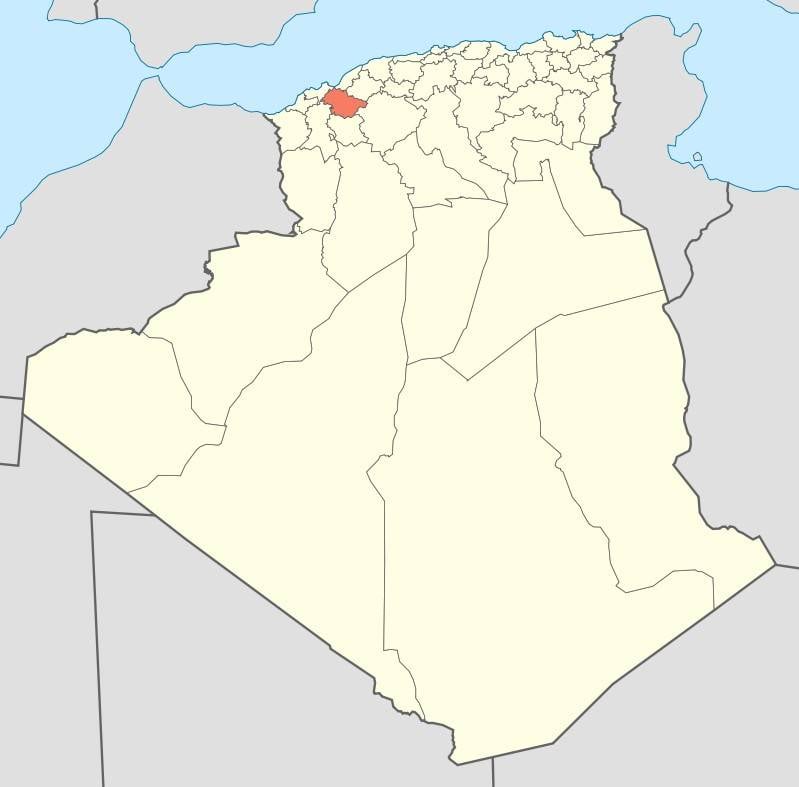
Not having achieved much success in the fight against him, the French in 1834 entered into a truce. It did not last long: hostilities resumed in 1835 and ended with the signing of a new truce in 1837. In 1838, the war broke out with renewed vigor and continued until 1843, when the defeated Abd al-Qader was forced to flee to Morocco. The ruler of this country, Sultan Abd al-Rahman, decided to provide him with military assistance, but in the battle of the Isli River his army was defeated. On December 22, 1847, the emir Abd al-Qader was captured and sent to France. Here he lived until 1852, when Napoleon III allowed him to leave for Damascus. There he died in 1883.
In 1848, Algeria was officially declared French territory and divided into prefectures, governed by the Governor-General appointed by Paris.
In 1881, the French and Bey Tunisia were forced to sign an agreement recognizing the French protectorate and consent to the "temporary occupation" of the country: the reason was the raids of idols (one of the tribes) on the "French" Algeria. This treaty provoked indignation in the country and an uprising led by Sheikh Ali bin Khalifa, but the rebels did not have a chance to defeat the regular French army. On June 8, 1883, a convention was signed in La Mars that finally subordinated Tunisia to France.
In 1912, it was Morocco's turn. The independence of this country, in fact, was guaranteed by the Madrid Treaty of 1880, signed by the heads of 13 states: Great Britain, France, the USA, Austria-Hungary, Germany, Italy, Spain and others, with a lower rank. But the geographical position of Morocco was very advantageous, and the outlines of the coastline looked extremely pleasant in all respects. The local Arabs also had another “problem”: at the end of the 1904th century, considerable reserves of natural resources were discovered on their territory: phosphates, manganese, zinc, lead, tin, iron and copper. The great European powers, naturally, were racing to “help” the Moroccans in their development. The question was who exactly would “help”. In 31, Great Britain, Italy, Spain and France agreed to divide the spheres of influence in the Mediterranean: the British were interested in Egypt, Italy was given to Libya, France and Spain were "allowed" to divide Morocco. But Kaiser Wilhelm II unexpectedly intervened in the "peaceful course of events", who suddenly visited Tangier on March 1905, 40 and declared German interests. The fact is that XNUMX German firms have already worked in Morocco, German investments in the economy of this country were very large, second only to the investments of the British and French. In the far-reaching plans of the military department of the German Empire, the outlines of the plans of naval bases and coal stations of the German fleet were already clearly traced. To the indignant demarches of the French, the Kaiser, without hesitation, declared:
The planned crisis was resolved at the 1906 Algeciras Conference, and in 1907 the Spaniards and the French began to occupy Moroccan territory.
In 1911, an uprising began in Fez, crushed by the French, which became an occasion for William II to “flex his muscles”: the German gunboat “Panther” came to the Moroccan port of Agadir (the famous “jump of the Panther”).
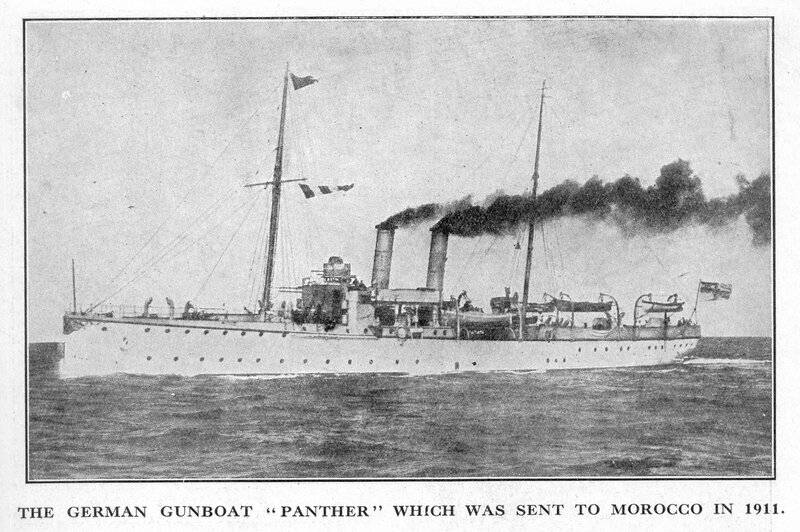
The great war almost began, but the French and Germans managed to agree: in exchange for Morocco, France ceded to Germany the territory in the Congo - 230 square meters. km and with a population of 000 thousand people.
Now no one interfered with France, and on May 30, 1912, the Sultan of Morocco Abd al-Hafid was forced to sign a protectorate agreement. In northern Morocco, de facto power was now vested in the Spanish High Commissioner, and the rest of the country was ruled by a general resident in France. Ahead were the Reef Wars (1921-1926), which would bring neither France nor Spain glory. But about them, perhaps, another time.
The Maghreb states were under French rule until the middle of the 1956th century: Tunisia and Morocco achieved independence in 1962, Algeria in XNUMX.
Then the reverse process began - the “colonization" of France by immigrants from the former North African colonies. Michele Tribalat, a modern French demographer in 2015, claimed that in 2011, at least 4,6 million people of North African descent lived in France, mainly in Paris, Marseille and Lyon. Of these, only about 470 thousand were born in the Maghreb states.

But that's another story.
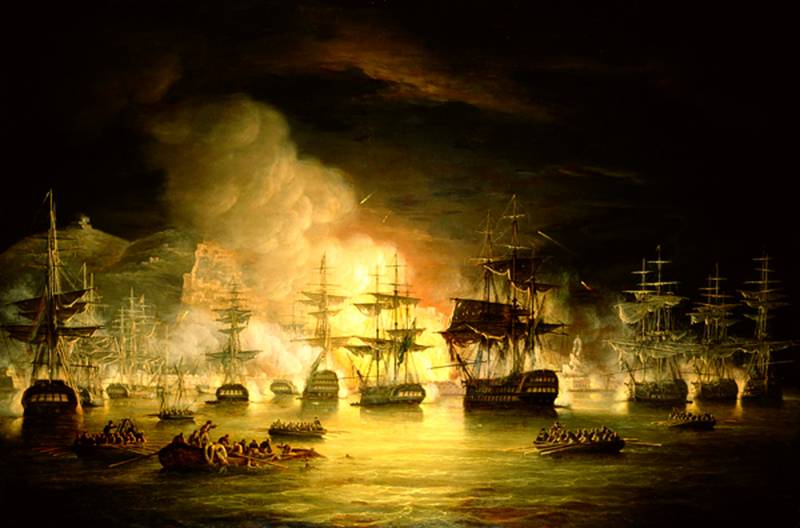
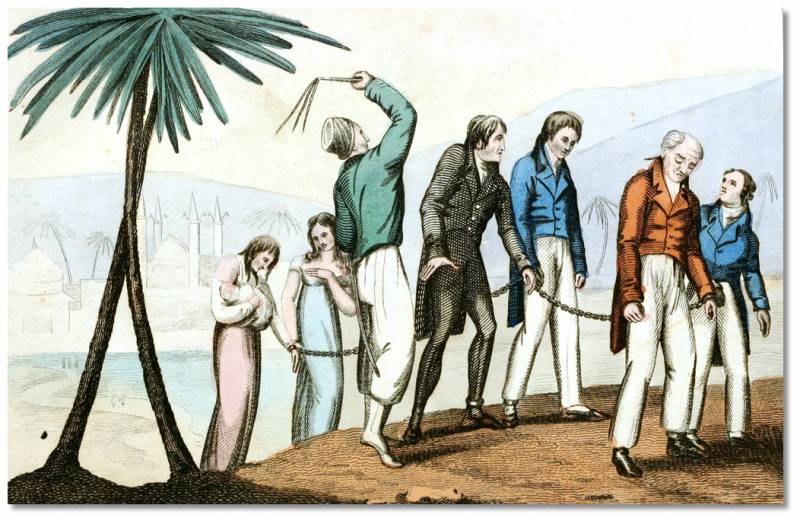
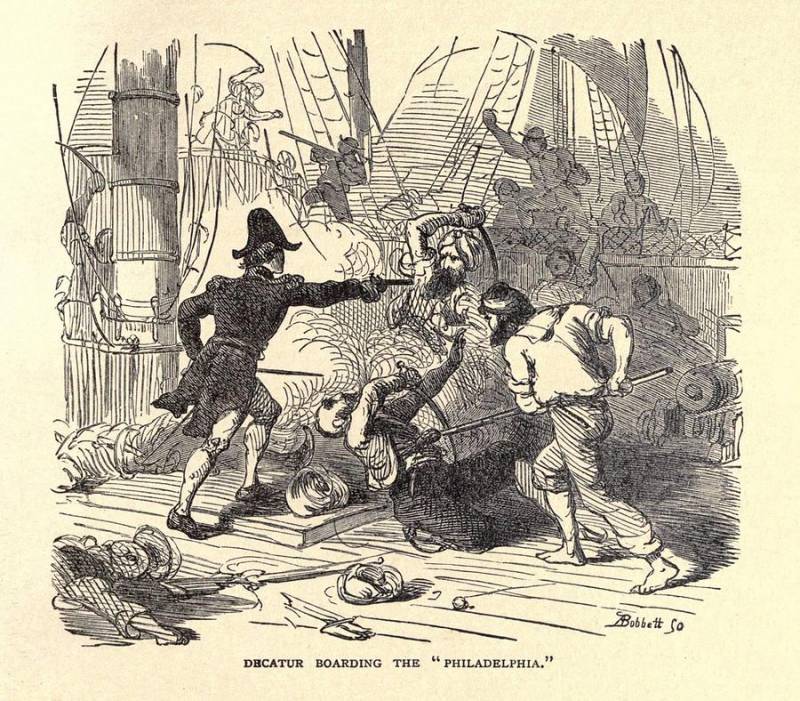
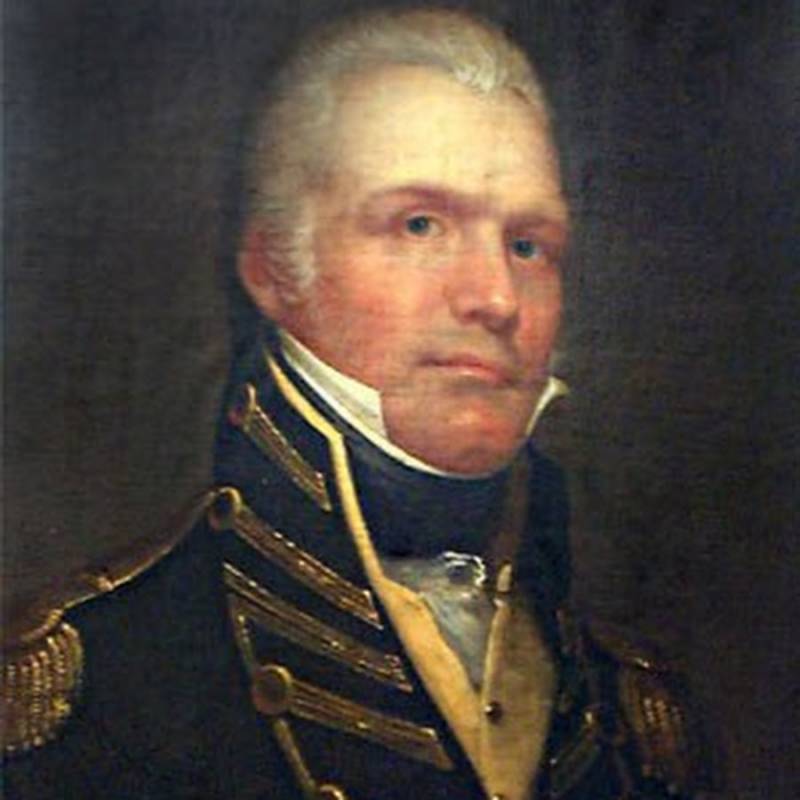
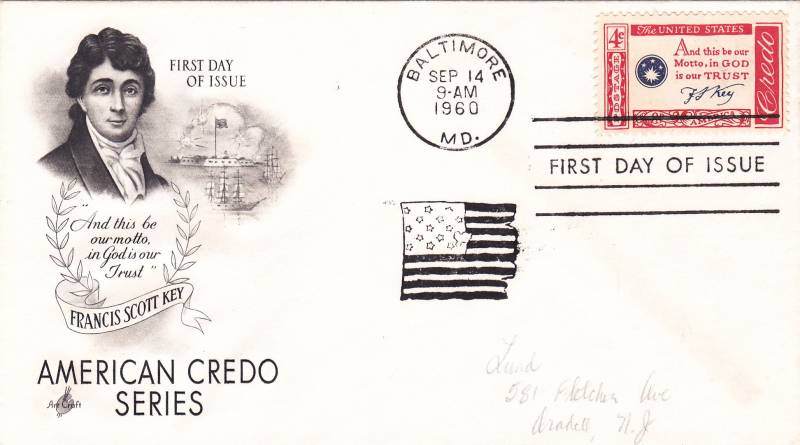
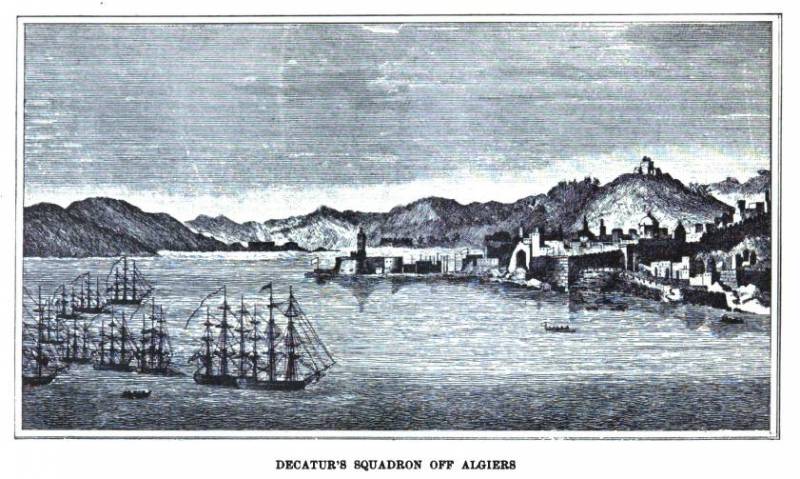
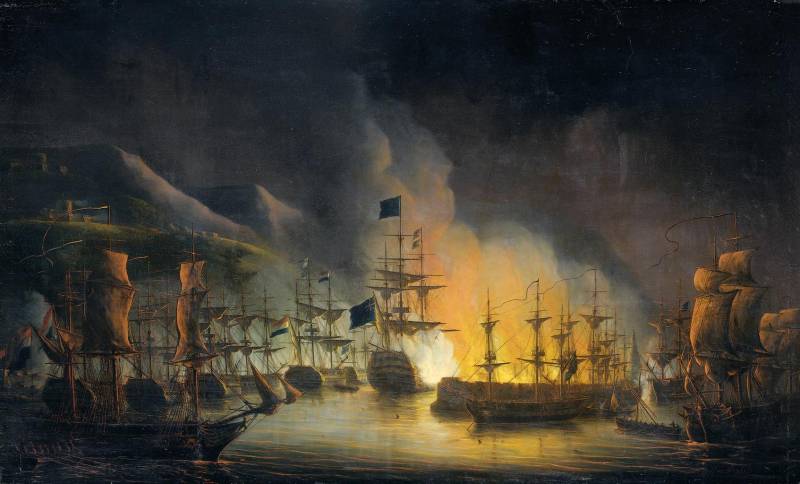
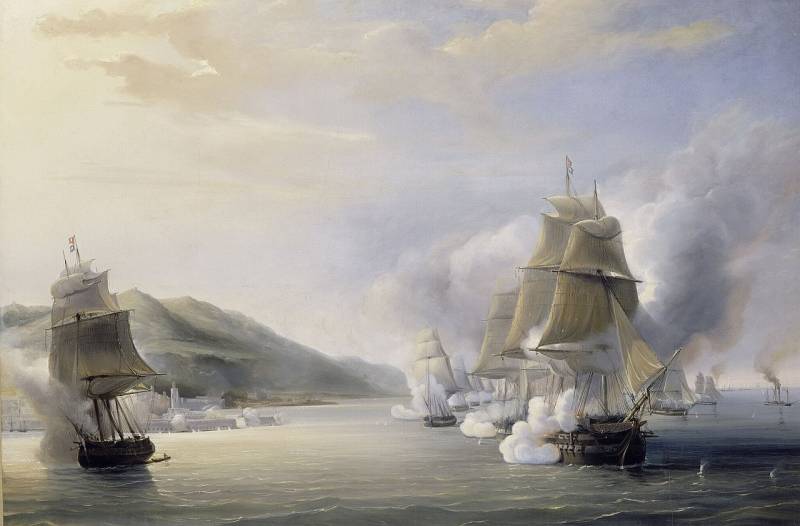
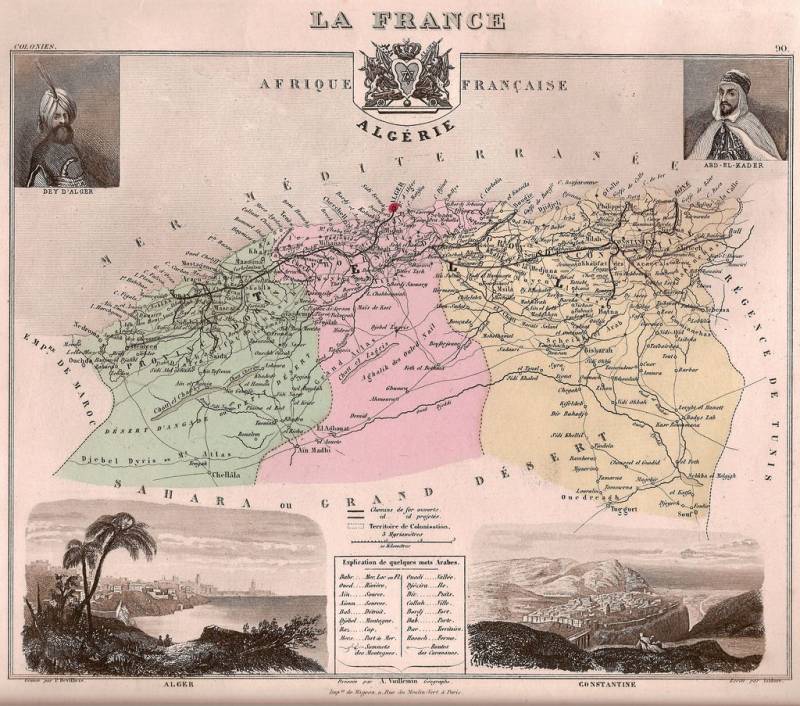
Information